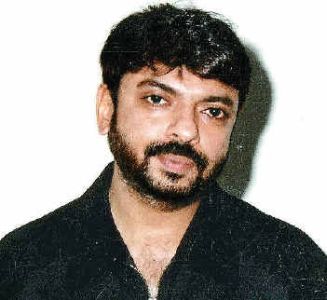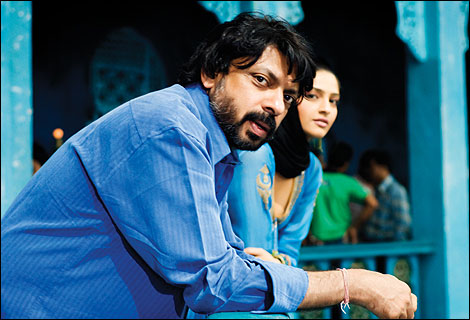Sanjay Leela Bhansali Biography
Date of Birth: 24 February 1963, Mumbai, India His work has passionate (and often damaged) individuals reaching out to each other over great distances to connect with each other.
His films often feature emotional pain and trauma being exprienced by his protagonists.Dedicates all his films to his deceased father.
Conceives his films in a unique fashion - he designs the film soundtrack first and then creates the film.Frequently sneaks scenes from his life into his films.
He is the only director, besides the legendary Guru Dutt, who created his films in total isolation from the public. In fact, two of Dutt's films - Kaagaz Ke Phool (1959) and Sahib Bibi Aur Ghulam (1962) - are Bhansali's favourite movies. His wish is to remake either or both of these movies at some point in his career, as well as to make a biopic on Guru Dutt's life.
At the premiere of Black (2005): Until recently I didn't even have a proper office. I've just a couple of staffers, hence my agitation and anxiety at the premiere. I single-handedly sent out all the invitations, called up every person individually and made sure they were all there at the premiere. I agree this isn't the way for me to function. But I'm basically a middle class boy from the chawls. I can't bring myself to trust others to do my work.Black for you may be darkness; for me it is a universal truth. Our best ideas come from the darkness of the mind; every new life is created in the darkness of the womb...
On disabled children: The physically challenged are not children of a lesser god. They're far more beautiful than the so-called normal people. They appreciate every shade of life, like my protagonist in Black (2005). She's a true-blue hero.
Deep down, the disadvantaged are angry with life. They want to see/hear/talk, but are constantly groping in the dark. They are so insecure about communication that there is a whole surrender in it. They get angry over the smallest of things! Imagine the frustrations of not being fully understood...anger is an important part of their expression.
About Alzheimer's disease: The idea of forgetting...things, names, persons...terrifies me. When I forget a little thing, it is an absolute trauma until it comes back to me again. All of us have these lapses of memory - what if memory doesn't return?
About the hearing-impaired: I was fascinated by the way in which teachers and parents struggled to reach out to hearing-impaired children. How do you start the communication, how do you keep it going? What takes other children a year to learn takes them ten years for them to absorb. I watched a mother trying so hard, and with such patience, to convey the simplest things - I wanted to make a film about it right away. I find their zest for life and unquenchable fighting spirit a thing to be admired. What a long tough struggle, yet they choose to live with energy and vitality! They don't want our pity, nor have I treated them as people who need our sympathy. You know, as they talk, they hold your hand - they're reaching out desperately, almost entirely through the touch; that is their most basic, urgent mode of communication, more than textbook grammar, than even the language of gesture. There is so much honesty in that touch. We don't touch each other anymore and I think we hear less because of that. I've never felt more reassured than when I held a deaf person's hand.
About his "lack of restraint": Listen, I was born and brought up in Bombay, where people shout at each other from the windows of flats on opposite sides of the streets. I belong to a community with a loud lifestyle. You can't expect dignity, propriety, control and detachment from ME! My talk is full-throated, my expressions full-blooded. I cannot make a film without melodrama.
About Devdas (2002): It's got a garish, nautanki format to it. I've paid tributes to all films like it, from Chaudhvin Ka Chand (1961) to Prem Rog (1982). I've made the film as Raj Kapoor would have made it - over the top. I can't get Bimal Roy's subtle format and delineation anyway...
About teachers: I have learned Odissi; I know what the teacher can do, why we touch his feet. We don't respect our teachers anymore, but to me God is the teacher. He comes into your life once - he can be neurotic, erratic, complex, but he transforms your life and perspective. You must not submit meekly, but question what you're taught. Then the teacher removes your fears about life, the world - and yourself...
What fun to explore a road not taken, to explore blacks, blues and grays instead of riotous colors! You know, those who do only the expected things evaporate form the minds of audiences. Audiences too want a change from the same boring formulas and anyway formulas are failing all the time. I believe that audiences make no special demands. Good fiction, made with honesty, conviction and entertainment, and they'll accept it...
About Saawariya (2007): Saawariya is a simple but exotic love story. True love is divine. It has to have yearning, disappointment and agony.
Sanjay Leela Bhansali
Sanjay Leela Bhansali
Sanjay Leela Bhansali
Sanjay Leela Bhansali
Sanjay Leela Bhansali
Sanjay Leela Bhansali
Sanjay Leela Bhansali
Sanjay Leela Bhansali
Sanjay Leela Bhansali Speaks About 'Guzaarish'
Sanjay Leela Bhansali At 'X Factor India'







No comments:
Post a Comment